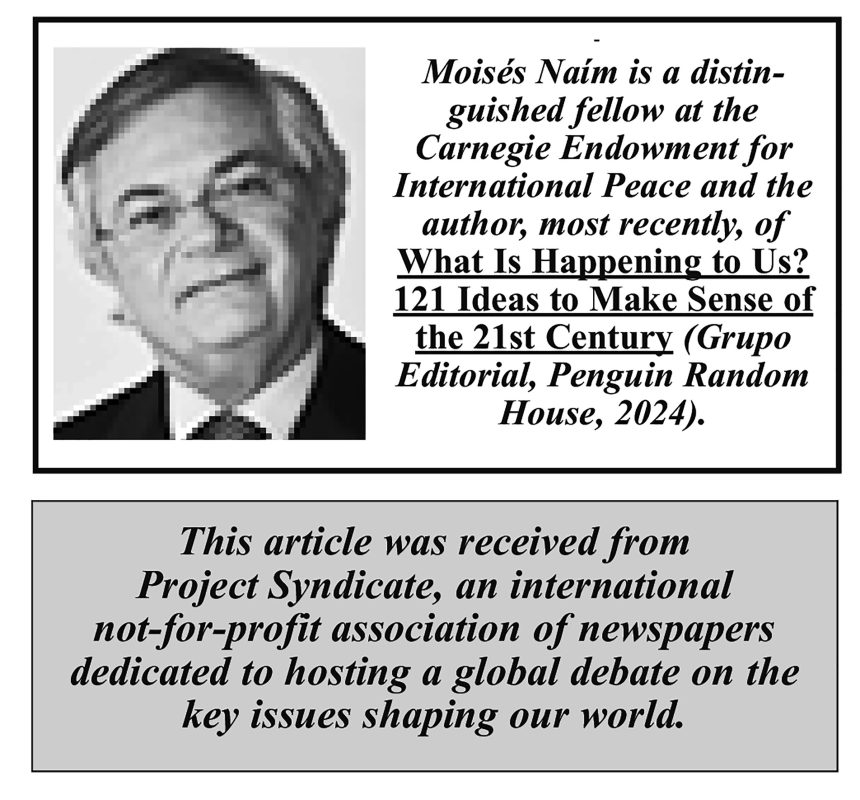By Moisés Naím
WASHINGTON, DC – When asked by a journalist what might derail his government, Harold Macmillan, Britain’s prime minister between 1957 and 1963, famously replied, “Events, dear boy, events!” He was right. Elected leaders (almost) always come to power with comprehensive plans and promises, only to have their attention diverted by crises and contingencies that no one anticipated.
US President-elect Donald Trump and his second administration will not be immune to this pattern. Although Republican control of Congress and the vast resources of the US federal government will give him plenty of room to maneuver, he will face a variety of crises – domestic and international – any one of which could overwhelm his administration.
Many risks are beyond the control of today’s governments. The most obvious is the climate emergency. Not a week goes by without new reports of catastrophic climate-driven events – from raging wildfires to increasingly powerful hurricanes – and the resulting costs to lives and livelihoods. Yet the institutions charged with responding to these disasters continue to struggle, because the organizations, laws, regulations, technologies, and budgets available to such agencies are obsolete or insufficient. Owing to the novelty and sheer scale of the challenge, national governments’ incompetence is a global phenomenon.
Moreover, the governmental response can be frustrated by outright denial of the problem. Trump, for example, has described global warming as a hoax perpetrated by China to undermine America’s industrial competitiveness. And even when he acknowledges the reality of the issue, he downplays the emergency, telling his supporters that rising sea levels will simply create “more oceanfront property.”
But, as Gillian Tett of the Financial Times reports, nearly half of all homes in the United States are already exposed to extreme weather events, and climate scientists agree that the frequency, ferocity, and costs of hurricanes and other climate-fueled disasters will only increase. Following this year’s devastating hurricane season, there is every reason to expect that over the next four years of his presidency, Trump will be forced to devote enormous public resources to emergency response and relief, rather than to his agenda.
Another major distraction could come in the form of a public-health crisis – like the COVID-19 pandemic that helped derail Trump’s re-election in 2020. As an article published by the Harvard School of Public Health recently warned, “new cases of bird flu and other infectious diseases continue to raise concern,” implying that the next pandemic is a case of “not if, but when.” Worse, experts agree that governments are not prepared to respond with the necessary speed and resources.
In this context, Trump’s nomination of Robert F. Kennedy, Jr. to lead the Department of Health and Human Services has understandably raised alarms. Kennedy is best known for denouncing vaccines and promoting alternative medicines that lack any scientific support. If he leads the US government’s response to another pandemic, the result would not only be distracting for Trump; it would potentially endanger millions of lives.
The economy could hold plenty of unwanted surprises as well. The nature of the business cycle is such that specific sectors (like construction) or even entire countries periodically enter a crisis, implying that it may be just a matter of time before the bears drive out the bulls. Potential sources of instability are not hard to find, including America’s enormous and growing fiscal deficits, fragile global supply chains, China’s increasingly precarious economy, anemic European markets, and the wars in Eastern Europe and the Middle East.
On top of these preexisting vulnerabilities are the new ones that Trump will introduce if he launches another trade war against China, cuts taxes for the rich, recklessly reduces the size of the government, and slashes regulations on the private sector. His agenda is a recipe for unanticipated consequences and government ineffectiveness.
Trump could also be caught off guard by his political opponents’ use of the judicial system to delay or block some of his initiatives. Yes, the Republicans’ electoral victory and previous success in confirming like-minded federal judges has opened possibilities for Trump that his recent predecessors did not have. But it is worth remembering that the US judicial system is highly decentralized, and that judges enjoy great autonomy. Even some of Trump’s own appointees have surprised him with their independence – and they are likely to do so again.
Finally, there is geopolitics, where the uncertainties are even more difficult to quantify or qualify. From an already boiling Middle East to an increasingly stormy Taiwan Strait, no region’s security or stability is assured. Trump may think that there are no serious consequences to his disdain for NATO and expressions of admiration for Russian President Vladimir Putin, but what if he’s wrong?
Trump’s supporters seem to believe that their leader is immune to the ups and downs of politics and history. But this illusion will not last long. Events will see to that.
Copyright: Project Syndicate, 2024.
